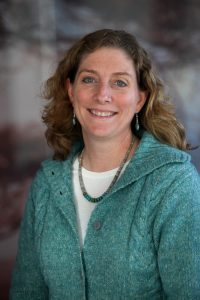Animal rescue pioneer
Katie Touhey Moore ’93, a leader in animal rescue techniques and marine mammal conservation, will present the 2016 LaDonne Heaton Schulman Alumnae/i Lecture on Thursday, April 21, at 5:30 p.m., in Hindle Auditorium.
The Schulman Lecture features distinguished alumnae/i working in the sciences.
Moore, who serves as program director at the International Fund for Animal Welfare (IFAW), develops and oversees the implementation of strategies to globalize animal rescue programs and establish IFAW as the premier animal rescue and relief organization worldwide.

At IFAW, which is based in Cape Cod, Moore assists animals stranded due to human-animal conflict, poaching, illegal wildlife trade and habitat loss. The organization responds to an average of 800 reports of stranded animals per year, and of those, an average of 234 need intervention or investigation, she said.
IFAW has multiple operations. Its Marine Mammal Rescue and Research (MMRR) team provides mutual aid to other U.S. stranding networks during major events, like the current sea lion die-off in California. The team also trains marine mammal stranding responders in other countries such as Chile, Peru, India and Trinidad.
The organization’s disaster response team rescues domestic animals and wildlife following natural and human-made disasters. The organization has rescued, rehabilitated and released wild animals—including everything from elephants to owls—in countries including Russia, India, Zambia and China.
Moore said she is used to operating in the worst of conditions, whether in a disaster zone or global conflict. The best part of the job? “The diversity of species and habitats in which I get to work,” she said.
Moore said she is particularly proud of IFAW’s success rescuing dolphins in Massachusetts. Traditionally, individual stranded dolphins, both sick and healthy, were euthanized unless they could be released with a group of dolphins—as groups safeguard dolphins from predators and work together when hunting.
MMRR challenged this premise, and successfully proved that individual dolphins can be released and successfully integrate into a group at sea, she said.
As a result, the philosophy, and more importantly, the protocols for handling single dolphins have changed, she said. “Now more animals have a chance at survival. It is the perfect integration of animal welfare and science.”
At Wheaton, Moore developed her own environmental studies major, allowing her to pursue her interests. (Since her time, Wheaton has established an environmental science major.)
“I had a wonderful interdisciplinary experience involving not only the sciences, but also economics, policy and religion. Access to so many disciplines gave me the diversity I needed to excel in graduate school and in my career,” said Moore, who went on to receive a master’s degree in environmental management from Duke University.
Moore said she benefitted from science courses taught by John Kricher, Scott Shumway and Elita Pastra-Landis.
Assistant Professor of Religion Barbara Darling-Smith had the largest impact on her path, she said—in particular, Darling-Smith’s course “Religion and Ecology.”
“One thing I always try to remember is to step back and think about the bigger picture. Think beyond the technical and scientific. Get to what it means. The science we do is really applied science. It’s science with a purpose. I need to feel like I am doing good in the world,” she said.
